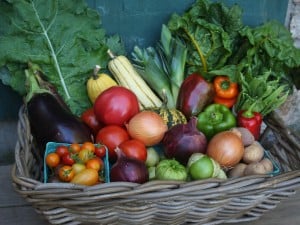It’s all-out gardening time. Plant everything you would like to grow! We here in the Athens area are officially past our frost-free date (and boy isn’t it obvious with this weather?!).
What this means for our gardeners is food! Gardens and gardens and gardens filling up with fresh homegrown food! Given our still imperfect capacity for predicting the weather, one can never be sure exactly how long or how intense a growing season is going to be, but for our location, the typical frost-free growing season begins some time in early May (around Mother’s Day), and ends some time in early October (around Indigenous Peoples’ Day), meaning our growing season is about 150 days long, give or take a week or so.
Many (but not all) of our most common vegetable crops need the guarantee of an entirely frost-free growing season to survive and produce. Now that we’re frost-free, we can plant a much larger variety of vegetables such as:
tomatoes, peppers, eggplants, tomatillos, cucurbits (squash, zucchini, cucumbers, melons, pumpkins, gourds), corn, beans, okra, sweet potatoes, and more!
Be careful though: For some crops, the long days and summer heat can be a bit too much for them to handle. Two particularly good examples of this are spinach and lettuce. Both are known for favoring cooler less intense weather conditions, and intense heat will actually cause a secondary form of seed dormancy, preventing germination. If you can get your lettuce and spinach seeds germinated and in place through the summer, another problem that will arise due to the long hot days of summer is that the plants are much more inclined to quickly bolt, or begin flowering and trying to produce seeds. The reason bolting is such a problem for these crops is that it makes them produce less and taste much worse. Spinach and lettuce both start out by growing their leaves in a tightly clustered circle at a uniform height close to the ground, called a rosette. Once the plants begin to bolt, they stop focusing their energy into producing leaves and send up a tall stem with flowers, while at the same time the leaves begin producing bitter compounds that make them much less palatable.
Happy Gardening Everyone!



Leave A Comment